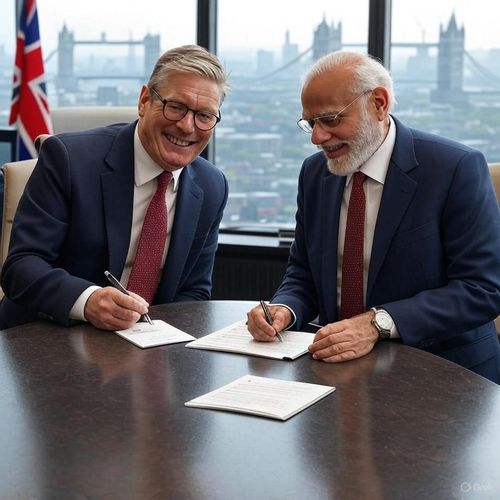India-Germany Logistics Partnerships Set for Expansion, Says VDMA Chief

Sarah J
Posted on Thu, Feb 20, 2025
Share the article with your network
India and Germany are poised to deepen their logistics collaboration, leveraging a robust strategic partnership established in 2000, according to a February 14, 2025, article from *Maritime Professional*. Highlighted during the second edition of LogiMAT India 2025 in Mumbai, this development follows a recent Memorandum of Arrangement (MoA) facilitating mutual logistics support between the two nations’ armed forces. Bertram Kawlath, Managing Director of VDMA India—a German engineering and manufacturing association—emphasized the potential for growth in bilateral logistics ties, aligning with India’s evolving role as a global trade hub. Below are the key highlights from the report.
Strategic Foundations and Recent Agreements
Since formalizing their strategic partnership, India and Germany have cultivated strong trade ties, with Germany as India’s largest trading partner in Europe and the seventh largest globally. In 2024, Germany ranked among India’s top foreign direct investment sources, channeling €12 billion ($12.87 billion) into India from 2000 to 2023. The recent MoA, signed prior to February 2025, enables mutual logistics support and troop exchanges, enhancing maritime security cooperation—a critical focus given India’s strategic position in the Indian Ocean.
LogiMAT India 2025: A Platform for Collaboration
The LogiMAT India 2025 exhibition, held February 13–15 at the Bombay Exhibition Centre, underscored this momentum. As India’s largest logistics trade fair, it convened industry leaders to explore business opportunities and showcase innovations. Kawlath noted Germany’s expertise in logistics technology—from automation to digitization—as a complement to India’s ambitions under initiatives like “Make in India” and the National Logistics Policy, which aim to reduce logistics costs to 9% of GDP within years, as projected by Union Minister Nitin Gadkari.
Economic and Trade Synergies
Germany’s advanced manufacturing and India’s cost-effective production capabilities create a natural synergy. The article highlights India’s push to streamline its $250 billion logistics sector, which currently accounts for 14% of GDP—higher than many developed economies. Collaborative efforts could integrate German precision with India’s scale, boosting efficiency in shipping, warehousing, and supply chains. This aligns with broader Indo-German economic ties, evidenced by over 1,800 German firms operating in India.
Future Prospects
Kawlath’s optimism reflects a shared vision: Germany seeks reliable partners amid global supply chain shifts, while India aims to enhance its maritime and logistics infrastructure. The partnership could expand beyond military logistics to commercial sectors, leveraging events like LogiMAT to forge new alliances. With India’s trade volume with Germany exceeding €25 billion annually, logistics stands out as a growth frontier, promising mutual economic benefits.
Announced on February 14, 2025, the strengthening of India-Germany logistics partnerships signals a strategic alignment with global trade dynamics. As both nations capitalize on their complementary strengths, this collaboration—spotlighted at LogiMAT India 2025—could redefine logistics efficiency and reinforce their positions in an interconnected world economy.
---
Join the exclusive network for leaders driving growth and partnerships in tech and science - www.startupeuropeindia.net
You may also like
Team S
Wed, Jul 30, 2025
US-India’s Game-Changing Satellite Launch: Unlocking Earth’s Hidden Secrets

Team S
Wed, Jul 30, 2025
Temasek Nets 10-Fold Gain with S$8.2 Billion Stake Sale in Schneider Electric India

Sarah J
Thu, Jul 24, 2025
UK and India seal Free Trade Agreement Signed in London
